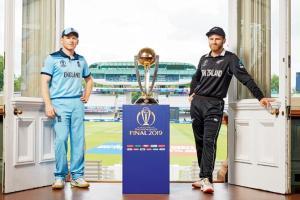London-based Paul Marsden has a creation to be proud of - the ICC Cricket World Cup trophy - which he designed in 1997; will not watch final at Lord's

England captain Eoin Morgan and NZ skipper Kane Williamson pose with the Trophy. Pic /Getty Images
 London: Every four years, the cricketing community awaits a world champion. And every four years, Paul Marsden makes it a point to watch who lifts world cricket's most prized trophy.
London: Every four years, the cricketing community awaits a world champion. And every four years, Paul Marsden makes it a point to watch who lifts world cricket's most prized trophy.
ADVERTISEMENT
Marsden is the creator of the ICC World Cup trophy which he designed in 1997. The trophy was first presented in the 1999 World Cup held in England. From the 1975 edition to 1983, the Prudential World Cup trophy was constant. However, from the 1987 to 1996 editions, three different World Cup trophies have been presented to the winning teams.
A replica of the World Cup trophy, created by Ashford-based Ottewill Silversmiths will be presented to the winning team today and the original will be back with the ICC once the presentation is completed.
'Hopefully, it's England'
"I was due to go to the fanzone and take my kids [eight and 13] to see the trophy, but I couldn't make it. I was hoping to be at Lord's but I am doing a cycling event tonight on the coast. So, I won't be there but like always, I will be glued to the TV to see the trophy being lifted by the winning team, which I am hoping will be England," he remarks during a chat with mid-day on the eve of the final here.
Marsden was working with Garrard & Co when he created this masterpiece. The trophy is completely handmade. "We were six or seven of us in the design team. It was all hand-drawn. There was no help from computers. We made a series of sketches before narrowing down on this one," recalls Marsden, who is now a freelancer.
Purely handmade
It took two weeks to develop the concept of the trophy. Then, a month to finalise and fine-tune the design. Thereafter, 12 to 16 weeks for the production of the trophy.
"I would always make it a point to ensure that none of the components were pre-manufactured. It was all hand-finished. Every part was handmade and that is why it takes a long time. Everything was made from scratch," says Marsden.
Marsden and his colleagues had a series of meetings with the ICC back then to develop the concept which is based on the three pillars of the game — batting, bowling and fielding.
Bat and ball component
"That became the focus of the design. The majority aspects are fairly recognised. You have got the cricket ball which represents the globe that has a world map. We wanted to create a trophy where the players who strive to win it would be really proud when they hold it," he says.
For someone who played cricket only in his childhood, Marsden says he was wary about how the trophy would be received by fans when he created it.
"At that time you don't know how it will be perceived and whether it will be continued for long enough. It is so heartening to see fans with cut-outs of the trophy either made of cardboard or from junk stuff. It is a proud moment when I see something which you created out of a blank page," says Marsden, who has also designed the English Premier League trophy. Today, when the trophy will be lifted for one more time, Marsden will watch with pride and if England win, he will savour the moment
for life.
Know the WC Trophy
- Weight: 11kgs
- Height: 650mm
- Base: Hardwood
Catch up on all the latest sports news and updates here. Also download the new mid-day Android and iOS apps to get latest updates
 Subscribe today by clicking the link and stay updated with the latest news!" Click here!
Subscribe today by clicking the link and stay updated with the latest news!" Click here!







